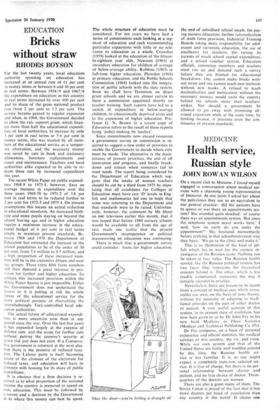MEDICINE
Health service, Russian style
JOHN ROWAN WILSON
On a recent visit to Moscow, I found myself engaged in conversation about medical ser- vices with a charming young representative of Intourist. At one point I asked her about the polyclinics they use as an equivalent to our general practice: did the patients have to queue or was there an appointments sys- tem? She sounded quite shocked: of course there was an appointments system. 'But since the telephone system never works here,' I said, 'how on earth do you make the appointment?' She hesitated momentarily before replying in that schoolmistressish way they have: 'We go to the clinic and make it.'
This is an illustration of the kind of pit- fall which lies in wait for the earnest in- vestigator of the Russian scene. Nothing can be taken at face value. The Russian health service, like the Russian political system, has two faces. One represents the theoretical concept behind it. The other, which is less readily volunteered, represents the way it actually operates in practice.
Nevertheless, there are lessons to be learnt from a concept of medical care which arose, unlike our own, on the basis of pure theory, without the necessity of adapting to tradi- tional attitudes on the part of either doctor or patient. A very useful account of this system, in its present state of evolution, has now been given to us by Dr John Fry in his new book Medicine in Three Societies (Medical and Technical Publishing Co 45s).
Dr Fry compares, on a basis of personal experience and official statistics, the medical services of this country, the us, and USSR. While our own system and that of the United States are fairly well trodden ground by this time, the Russian health ser- vice is less familiar. It is, as one might expect, a completely state-run, salaried ser- vice. It is free of charge, but there is no per- sonal relationship between doctor and patient, and no free choice of doctor. Three- quarters of the doctors are women.
There are also a great many of them. The Soviet Union is proud of the fact that it has more doctors per head of population than any country it the world. It claims one
physician for every 480 people, as com4 pared with one for 670 in the us and one for 900 in the tre. It also claims a higher population of medical auxiliaries, particu-
larly in the form of 'feldshers', a class of middle-grade medical worker with a short-, ened basic training, who are used as doctors
in remote areas or for handling the less complex routine tasks in the polyclinics. The function of the feldsher is very similar to that of the medical assistants who carry out the bulk of the routine medical work in the underdeveloped nations of Africa.
Two other characteristics guaranteed to gladden the heart of progressives are an emphasis on preventive medicine and a belief in the importance of specialist train- ing, not simply for hospital doctors but for workers within the polyclinics. The clinics are large units serving a population of per- haps 50,000 people. The practitioners with- in them tend to specialise, and there are specialist polyclinics for children's diseases, women's diseases, skin diseases, and so on. It is reported that half the attendances at polyclinics are for 'preventive examinations'.
This sounds absolutely wonderful, if a little impersonal. The vogue thinking nowa- days is that preventive medicine is such a manifestly good thing that to question its value places one immediately back in the days of the Bourbons. And yet it does seem a little odd that, in spite of spending a vastly greater proportion of time on these
preventive examinations, the incidence of established disease is no less than it is in the us or the UK. Indices such as maternal mortality rate, for example, show no advan- tage to the Soviet system. As for the incid- ence of hospitalisation, this seems to lead one to the opposite conclusion. It seems that an average of 20 per cent of the popu- lation are admitted to hospital during a year in the USSR, as opposed to 15 per cent in the us, and 10 per cent in the UK. Granted that there may be social reasons for this, such as the bad state of housing in the Soviet Union, it still doesn't look as if all those prophylactic examinations are pro- ducing any obvious results to date.
So perhaps we should be rash to expect that more doctors and more preventive clinics will solve our own health problems, any more than they have solved those of the Russians. Nor does it seem that big modern buildings and the abolition of the family physician lead to an obvious increase in efficiency; one difference in the Soviet system is that the Russian doctor, being a salaried employee with a statutory working week, works much less hard than his coun- terparts in Britain and America. There is no record of costs, but it is reasonable to sup- pose, on a basis of the number of personnel and the time patients spend in hospital, that the Russian system is at least as expensive, and probably more expensive, than our own. It is also, of course, impossible to operate in a free society, since the compulsory direc- tion of doctors to unpopular areas is an integral part of the organisation.
One enviable advantage the Russians do have, however, is in their management of mental illness. As Dr Fry says, the official attitude is that 'because of Soviet social achievements the prevalence of mental ill- ness is low and will decrease furthei because of further social and cultural achievements'. We must all wish we could dispose of our more intractable diseases as easily as that.
Denis Brogan's 'Table talk' returns next week,







































 Previous page
Previous page